‘Soros’ documentary gets negative reviews
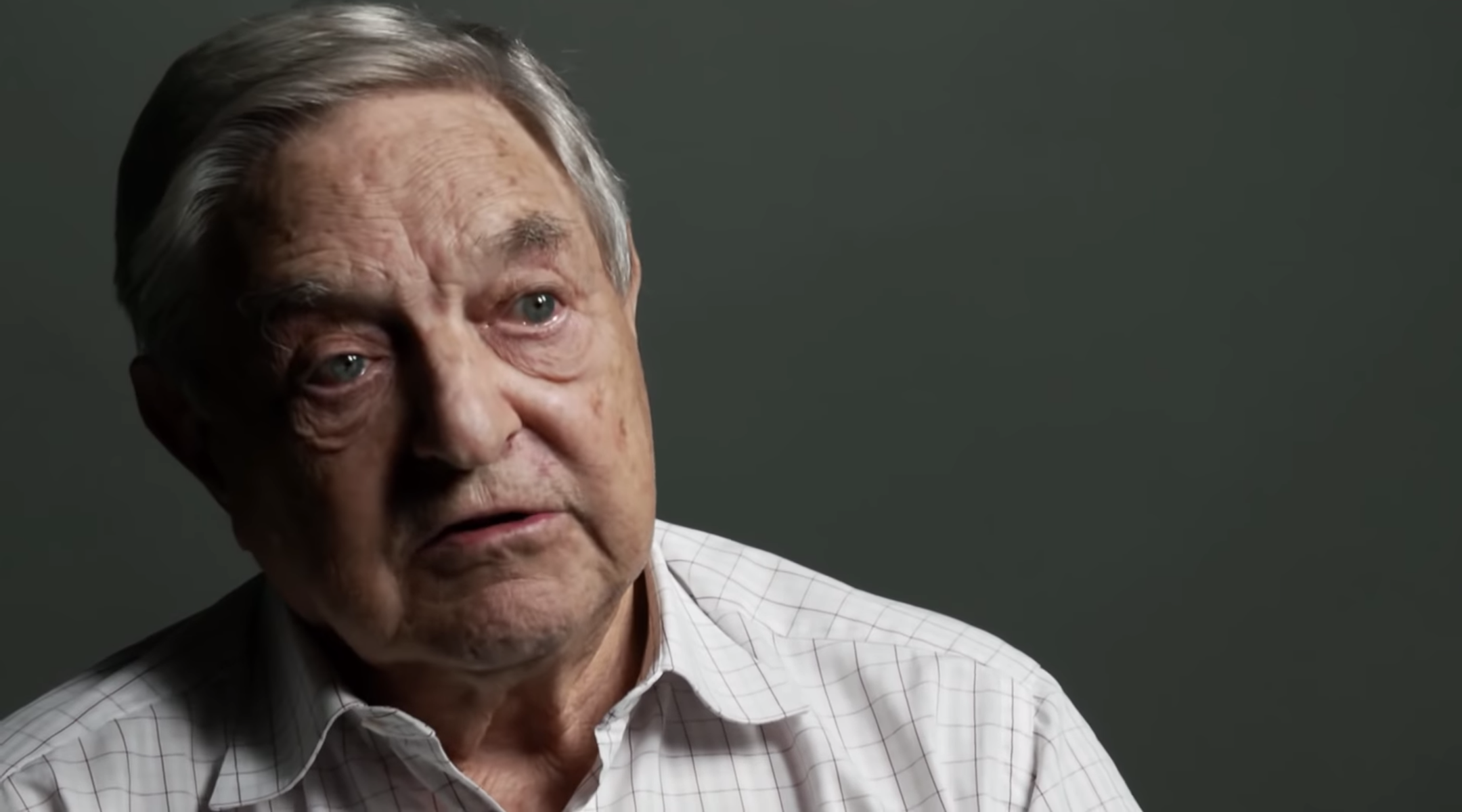
A new documentary about George Soros, pictured above giving an interview in the film's trailer, has been called a 'hagiography.' (Screenshot)
(JTA) — A new documentary about George Soros, made by someone who used to work for him, was released online Friday to less-than-positive reviews.
According to reviews, the movie is largely about Soros’ support of global human rights causes and portrays him in an almost exclusively favorable light. Critics have lamented that the movie is light on detail about Soros’ life and career.
If Soros’ charity “had a headquarters that offered tours, this is the film they’d have on continuous loop in the visitors’ center,” read a review from Variety. The New York Times review said that, “even as hagiography, ‘Soros’ is unfocused; it races from topic to topic, with clips that seem arbitrary at best.”
Soros, 90, the Jewish Holocaust survivor and billionaire hedge fund manager, is known for his prolific giving to human rights groups and liberal causes around the world, and to Democratic politicians in the United States. He is most famous on Wall Street for his shorting of the British pound in the 1990s. In recent decades he has become a prime target of conservatives and right-wing activists, whose criticism of him often veers into conspiracy theory and anti-Semitic stereotypes that have inspired violent attacks.
The movie, called “Soros” and released in virtual cinemas, was made by Jesse Dylan, a former video producer for Soros’ Open Society Foundations who is also Bob Dylan’s son.
Tom Hanks joins campaign to turn Pittsburgh Tree of Life synagogue into anti-racism center
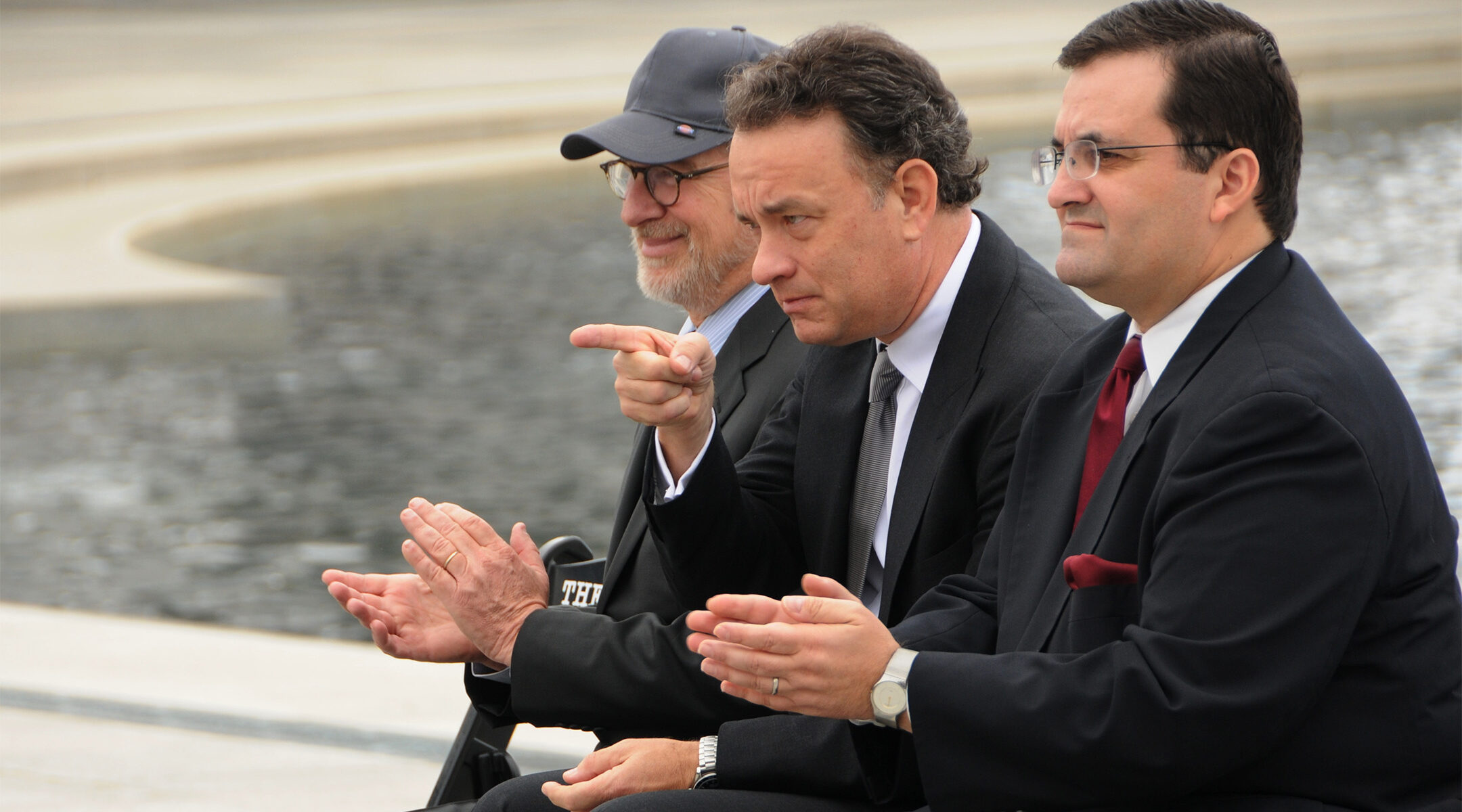
Actor Tom Hanks, center, points to veterans at the World War II Memorial in Washington, DC on March 11, 2010.(Wikimedia Commons)
(JTA) — Actor Tom Hanks and singer Billy Porter have agreed to help lead a fundraising campaign to help turn Pittsburgh’s Tree of Life synagogue into an anti-racism center.
Pennsylvania Governor Tom Wolf and Joanne Rogers, wife of the late television show host Fred Rogers, will also be members of a “cabinet” to support the renovation of the Tree of Life building, where a gunman killed 11 Jews in 2018, Rabbi Jeffrey Myers said in a statement Wednesday.
“Through this effort and with the support of people of all backgrounds, we will transform a site of hate and tragedy into a site of hope, remembrance and education,” the Pittsburgh Jewish Chronicle quoted Myers as saying.
The community is raising funds for the project in a campaign titled “Remember. Rebuild. Renew.” Reports about did not specify the campaign’s fundraising goal.
Eatery said to be world’s 1st lab-grown meat restaurant opens near Tel Aviv

A chicken burger advertized on the website the The Chicken, a restaurant that serves lab-grown meat in Nes Tziona, Israel. (screenshot)
(JTA) — The world’s first lab-grown meat restaurant has opened near Tel Aviv, the Los Angeles-based VegNews reported.
The eatery, whose name is “The Chicken” — a reference to the pseudo-intellectual quandary over whether it precedes the egg or the other way around — is adjacent to the factory of its mother company, SuperMeat, in the Tel Aviv suburb of Nes Tziona, according to a VegNews report from last week.
Tables must be reserved in advance and patrons do not pay as the restaurant is still in test phase, Walla reported. They are, however, requested to answer questions or offer feedback.
The menu of The Chicken features two burgers made of “crispy cultured chicken fillet” grown from cells in SuperMeat’s factory.
“The burger has a juicy chicken flavor, crispy on the outside and tender on the inside,” SuperMeat CEO Ido Savir told Fast Company. The taste is indistinguishable from that of slaughtered animals, he said.
SuperMeat was established in 2015 to offer an alternative to meat whose production requires animal suffering.
Some rabbis argue lab-grown meat is exempt from traditional kosher meat requirements, but others say the same prohibitions, including salting and separating from dairy, do apply.
“Here, from the beginning it’s not considered meat because it’s a microscopic thing. … And even if it were really meat, because it changed its form, a ‘new face has arrived here’ and it’s not considered meat, and it’s clearly parve,” an Israeli rabbi told the Jewish Telegraphic Agency in 2016.
Toronto suburb to rename street named after Nazi naval officer
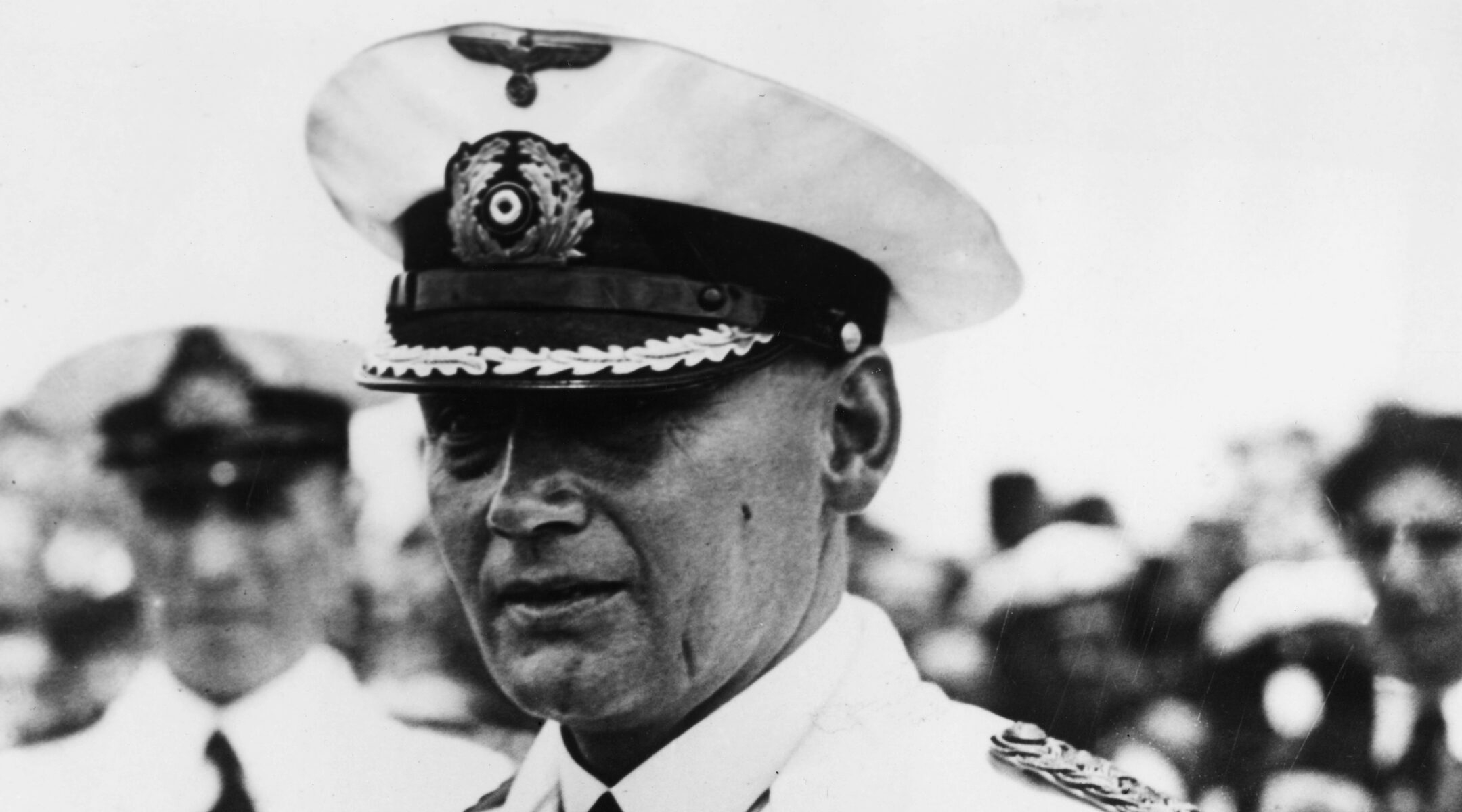
Hans Langsdorff was commander of the Nazi German battleship Graf Spee. (Keystone/Getty Images)
(JTA) — A suburb of Toronto will rename a street named for Nazi naval officer Hans Langsdorff.
The town council of Ajax, a suburb northeast of Toronto, voted 4-3 this week to rename Langsdorff Drive after a Jewish-led campaign, according to B’nai Brith Canada, a Jewish organization that advocated for the change.
The town is named after a British ship, the HMS Ajax, that won a 1939 battle against a ship commanded by Langsdorff.
An online petition to change the name garnered more than 900 signatures. The vote to change the name came after a Holocaust survivor testified at the town council meeting.
“Taking action against the glorification of Canada’s enemies and a man who fought for the most evil regime in history sends the right signal to those concerned about the rise of hate in our time,” said Michael Mostyn, B’nai Brith Canada’s CEO.
In Israel, Pompeo makes historic moves, including first visit to West Bank settlement for a secretary of state

Secretary of State Mike Pompeo speaks alongside Israeli Foreign Minister Gabi Ashkenazi after a security briefing on Mount Bental in the Israeli-annexed Golan Heights on the border with Syria, Nov. 19, 2020. (Patrick Semansky/Pool/AFP via Getty Images)
(JTA) — Mike Pompeo became the first U.S. secretary of state to visit an Israeli settlement in the West Bank on Thursday.
At a news conference in Jerusalem with Israeli Prime Minister Benjamin Netanyahu, Pompeo also said that the Trump administration will cut ties with any groups that support the boycott Israel movement, which the U.S. will officially consider anti-Semitic.
Later in the day, he visited the Psagot winery in a settlement near Ramallah, the Palestinian Authority’s capital, and his office announced that the State Department will enforce that goods produced in places in the West Bank “where Israel exercises full control” will be labeled “Made in Israel” when sold in the U.S. The international requirement since 1995 has been to label such goods as made in the West Bank.
He also visited the Golan heights, which most of the international community sees as occupied territory, and spoke from a hilltop. The State Department recognized the territory as part of Israel last year.
“I very much wanted to come here on this trip to tell the world that we have it right. That we, the United States has it right. That Israel has it right,” he said Thursday.
Netanyahu applauded the series of historic moves as “wonderful,” while the Palestinians condemned them.
“[T]he State Department took the wrong view of settlements. It took a view that didn’t recognize the history of this special place,” Pompeo said. “And instead, now, today the United States Department of State stands strongly to the recognition that settlements can be done in a way that are lawful and appropriate and proper.”
Prior U.S. administrations have seen settlement expansion as an impediment to peace and a two-state solution to the Israeli-Palestinian conflict.
On BDS, or the Boycott, Divestment and Sanctions movement, Pompeo added that “we will immediately take steps to identify organizations that engage in hateful BDS conduct, and withdraw US government support for such groups.”
The movement “urges action to pressure Israel to comply with international law” in regards to its occupation of land in the West Bank, but many critics say it is built on anti-Zionist and anti-Semitic concepts.
While at the winery, which has named a vintage after him, Pompeo wrote in the visitor’s book that he hopes he will not be “the last secretary of state to visit this beautiful land.”
Correction: This article originally cited an incorrect claim in a New York Times article that Pompeo was the first U.S. secretary of state to visit the Golan Heights.
750 Jewish and Holocaust scholars sign petition protesting far-right politician tapped to lead Yad Vashem
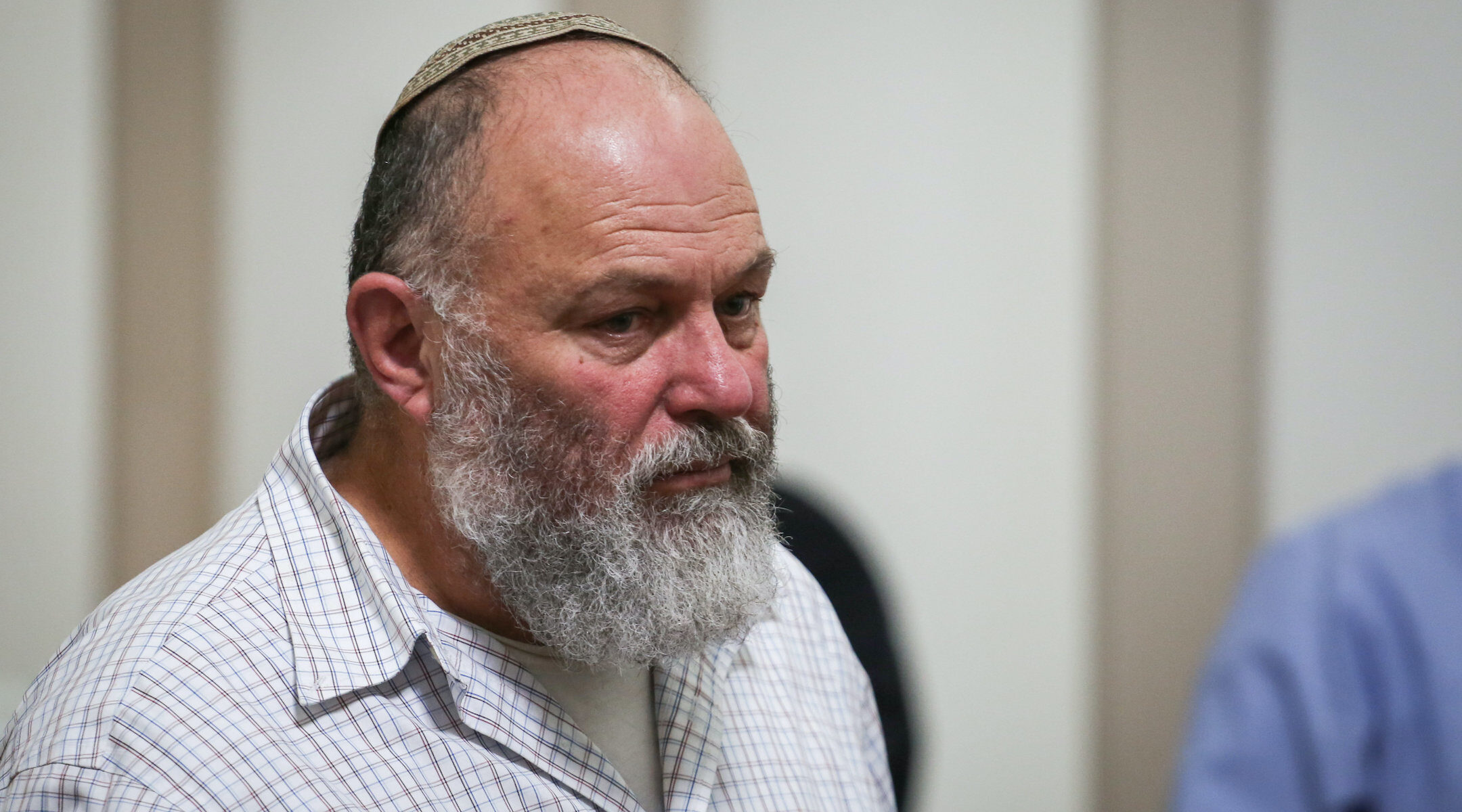
Effi Eitam, seen in a 2014 photo, is a former general who led a religious Zionist party. (Flash90)
(JTA) — A broad coalition of Jewish studies scholars and directors of Jewish and Holocaust museums has signed a petition opposing the proposed appointment of Effi Eitam, a far-right Israeli politician, to chair Israel’s Holocaust museum.
The petition, which has 750 signers, is the latest protest against Eitam. Prime Minister Benjamin Netanyahu and his allies advanced Eitam’s candidacy earlier this year to be the next chairman of Yad Vashem, which serves as a Holocaust museum, memorial and research center. Eitam is a former decorated general in the Israel Defense Forces and was a government minister who led a right-wing religious Zionist party.
His critics say he is unfit to lead the institution because he called for most Palestinians in the West Bank to be expelled and for Arab Israelis to be excluded from the country’s political system. Eitam also was reprimanded by the IDF’s chief of staff because soldiers under his command beat a Palestinian to death. His supporters point to his experience as a general and political leader.
Israeli politicians, Holocaust survivors and the Anti-Defamation League have called for his name to be withdrawn. Now they have been joined by the hundreds of scholars, including Susannah Heschel and Deborah Lipstadt. The list also includes the current or former directors of the Buchenwald memorial and Jewish museums in Budapest, Warsaw, Munich and elsewhere.
“Eitam’s hateful rhetoric towards Israeli Arabs and Palestinians stands in opposition to the stated mission of Yad Vashem,” the petition reads. “Appointing Effi Eitam as Chair of Yad Vashem would turn an internationally respected institution devoted to the documentation of crimes against humanity and the pursuit of human rights into a mockery and a disgrace.”
Jon Ossoff defends Raphael Warnock as a ‘beloved’ ally of Georgia’s Jewish community
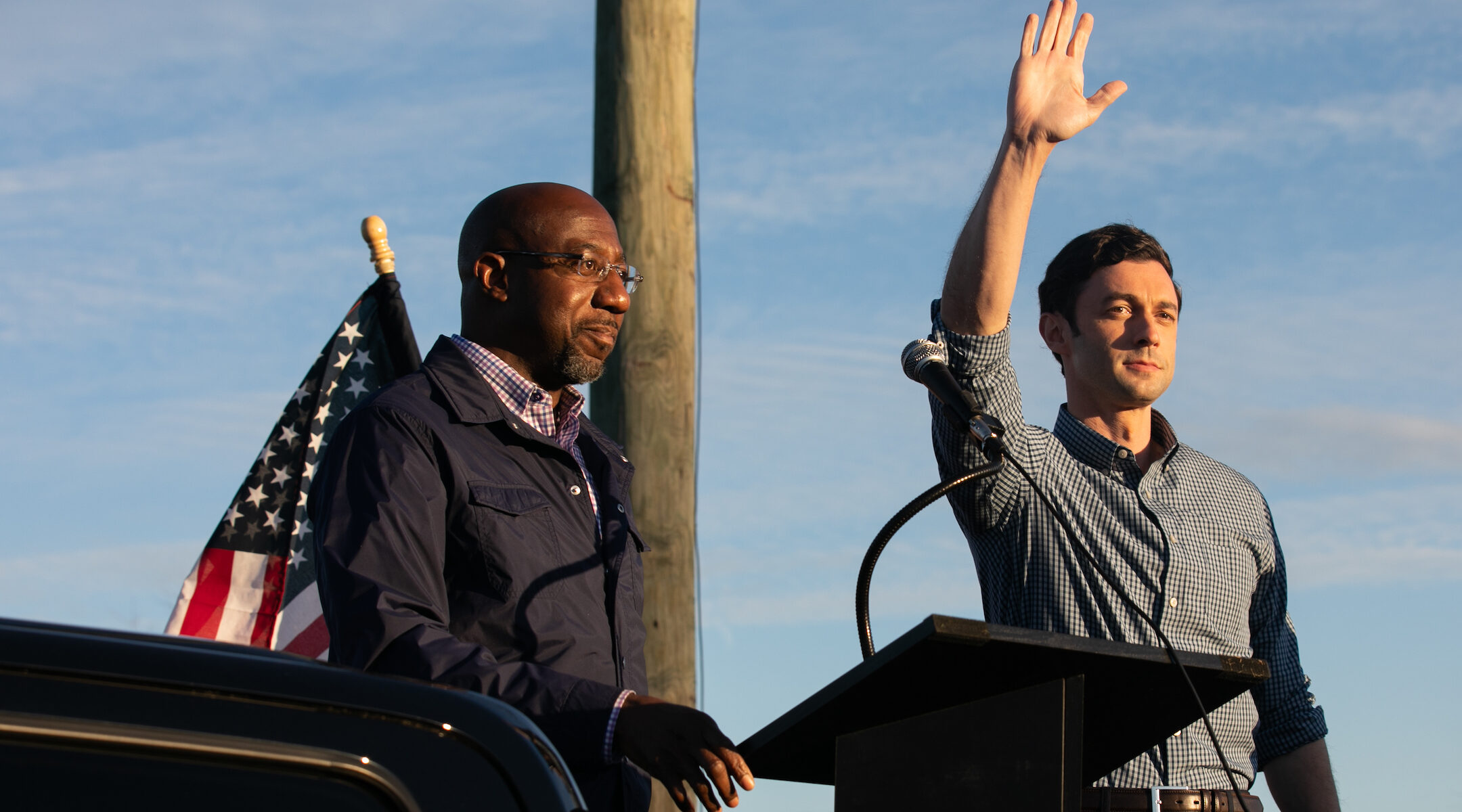
Democratic Senate candidates Rev. Raphael Warnock, left, and Jon Ossoff acknowledge supporters during a rally in Marietta, Ga., Nov. 15, 2020. (Jessica McGowan/Getty Images)
(JTA) — Jon Ossoff, the Jewish candidate running in a key runoff election for a U.S. Senate seat in Georgia, defended his fellow Democratic hopeful Rev. Raphael Warnock in the wake of attacks on Warnock’s Israel record.
“Reverend Warnock is a beloved friend and ally of Georgia’s Jewish community and a friend of Israel,” Ossoff told the Forward on Wednesday. “Kelly Loeffler’s baseless attacks on the reverend make me sick.”
Warnock, the senior pastor at the historic Ebenezer Baptist Church in Atlanta, is running to unseat Loeffler, a Republican. Not long after Warnock advanced to the January runoff earlier this month, Jewish Insider published an article titled “Raphael Warnock signed letter likening West Bank to apartheid South Africa.” Loeffler tweeted on Nov. 9 that Warnock has a “long history of anti-Israel extremism.”
Warnock signed the letter in question after a trip with other Christian clergy to Israel last year. It called for a renewed commitment to a two-state solution and decried “the conditions in which Palestinian communities live.” The letter also said that “the heavy militarization of the West Bank” was “reminiscent” of the way apartheid South Africa governed Namibia, its colony.
A 2018 sermon by Warnock circulated as well in which the pastor said “We need a two-state solution where all of God’s children can live together … We saw the government of Israel shoot down unarmed Palestinian sisters and brothers like birds of prey. … It is wrong to shoot down God’s children like they don’t matter at all.”
Warnock has since said that he is staunchly pro-Israel.
“Claims that I believe Israel is an apartheid state are patently false — I do not believe that,” he said earlier this month.
Valerie Habif and Joanie Shubin, who founded Jewish Democratic Women’s Salon, Atlanta, an activist group that helps elect Democrats in Georgia, defend Warnock.
“He has been a friend to Atlanta’s Jewish community throughout his tenure at the Ebenezer Baptist Church and a regular speaker and visitor to Atlanta’s synagogues,” they told the Jewish Telegraphic Agency.
In his statement, Ossoff attacked his opponent, Sen. David Perdue, for a widely criticized ad in which the Republican incumbent’s campaign lengthened the size of Ossoff’s nose.
“[Warnock’s] spiritual leadership and his interfaith outreach are deeply appreciated across our state,” Ossoff said. “Maybe Senator Loeffler should focus her attention on David Perdue who lengthened my nose in his attack ads.”
Black Jewish novelist Walter Mosley honored with National Book Foundation’s lifetime achievement award

Walter Mosley at the premiere of the third season of the FX show "Snowfall" at Bovard Auditorium at the University of Southern California, July 8, 2019. (Leon Bennett/WireImage/Getty Images)
(JTA) — Black Jewish novelist Walter Mosley received one of the National Book Foundation’s highest honors on Wednesday night: the Medal for Distinguished Contribution to American Letters.
Since 1988, the lifetime achievement award has gone to Joan Didion, Ursula Le Guin and Toni Morrison, among others. Mosley is the first Black man to win the medal in its history, but not the first Jewish man — writers such as Saul Bellow, Philip Roth and Arthur Miller have won it in past years.
Mosley, 68, is perhaps best known for his “Easy Rawlins” mystery series, centering on Easy, a Black private detective in Los Angeles in the 1960s. The first of the series, “Devil in a Blue Dress,” was adapted into a 1995 movie starring Denzel Washington.
Mosley has not just stuck to the crime genre, however; he has written more than 60 books spanning genres, from Afrofuturist science fiction to plays. He even won a Grammy Award in 2001 for Best Album Notes for comedian Richard Pryor’s compilation “…And It’s Deep Too!”
Mosley began writing later in life, at age 34. One of Mosley’s mentors, the Irish novelist Edna O’Brien, encouraged him to write his first novel by telling him: “You’re Black, Jewish, with a poor upbringing; there are riches therein.”
“In a way, to be a Jew is to be a part of a tribe,” Mosley said in 2010, reflecting on his Jewishness. “Being a part of a tribe, you can never really escape your identity. You can be anything inside, but in the end you’re always answerable to your blood.”
He was born to a Jewish mother and a Black non-Jewish father in Los Angeles. He once told the St. Louis Jewish Book Festival: “I grew up with half-sour kosher pickles and collard greens, and I enjoyed both sides of my family.”
“I feel equally descended from both of my parents and their backgrounds,” he added in that interview.
In his acceptance speech at the virtual National Book Award ceremony, Mosley mused on the nature of being the “first,” and referenced the 1970 record by Curtis Mayfield, “We the People Who Are Darker Than Blue”:
There’s a great weight hanging over the reception of an award when the underlying subject is the first Black man to receive. We, the people who are darker than blue, have been here, on this continent, in this storm, for 400 years. As of a matter of course, we have been chained, beaten, raped, murdered, robbed of our names, our history, and often even our dignity. This has been an ongoing process. An unending anguish. And so one might be cowed by the monumental negative space surrounding that pinprick of light that this award represents.
Trump’s White House is throwing an in-person Hanukkah party despite COVID concerns
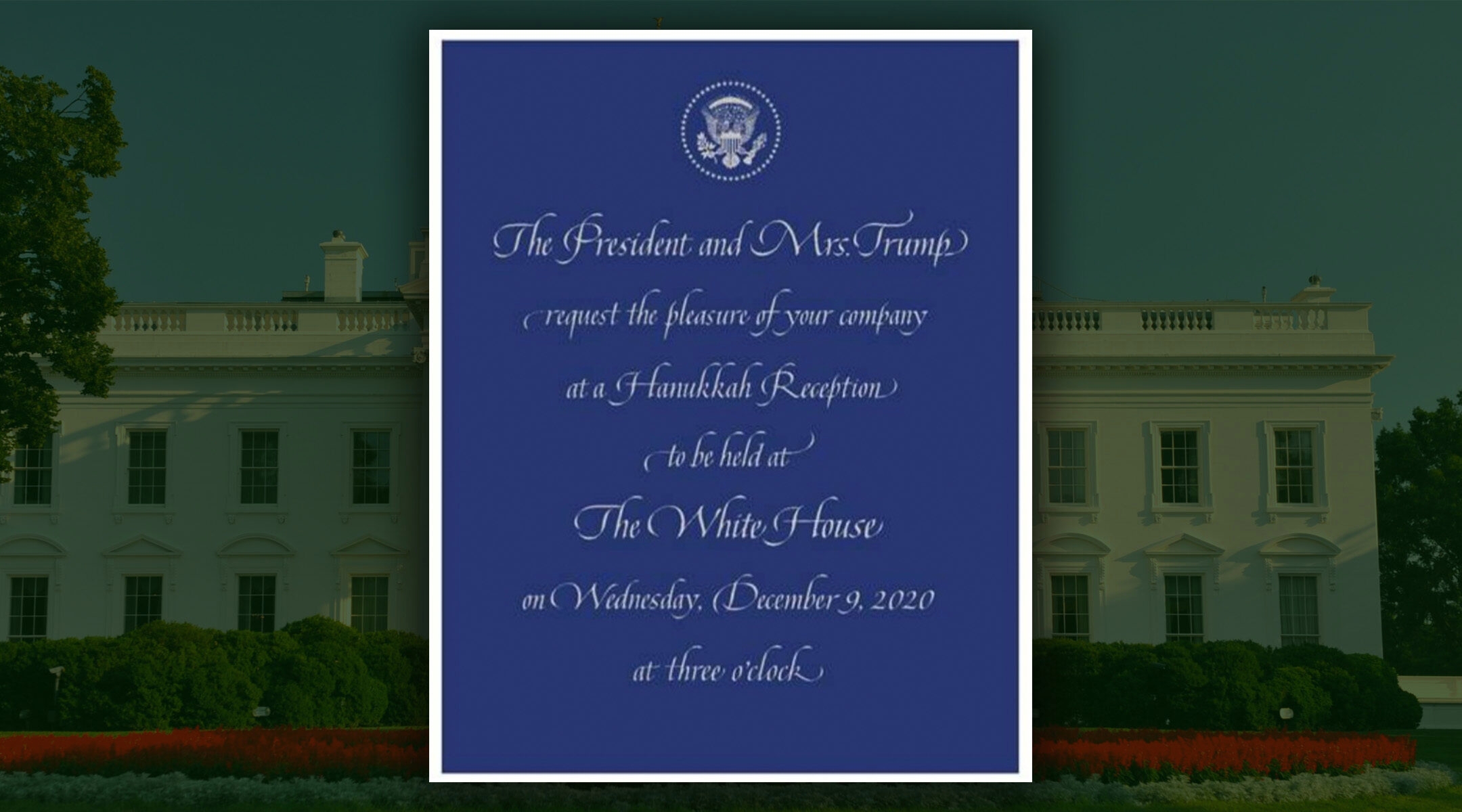
An invitation to the White House Hanukkah party (Courtesy)
WASHINGTON (JTA) — The Trump White House is throwing an in-person Hanukkah party, one of a series of recent events the administration has held despite coronavirus concerns.
The reception will be held Dec. 9 in the afternoon, a day before the holiday’s first candle lighting, according to an invitation obtained by the Jewish Telegraphic Agency.
The White House did not immediately respond to a request for comment.
President Donald Trump has come under fire for holding a number of crowded events at the White House, including several that are believed to have spread the coronavirus. Dr. Anthony Fauci, the country’s leading infectious disease specialist, called the reception for recently confirmed Supreme Court Justice Amy Coney Barrett a “superspreader event.”
Jewish staff held semi-formal Hanukkah parties during the Clinton administration, but George W. Bush was the first president to make them a formal event. President Barack Obama continued the tradition, increasing the parties to two per year to meet demand. Trump also has held two Hanukkah parties each year of his presidency.






